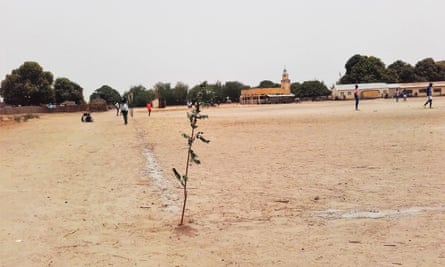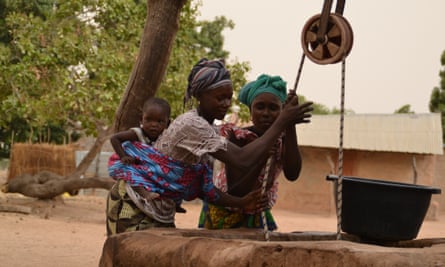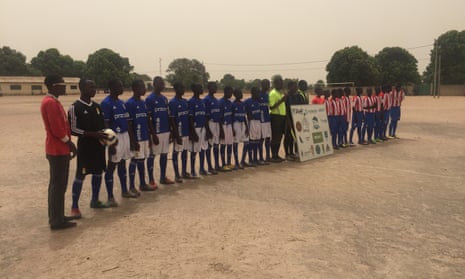Real Oviedo and Sporting Gijón faced each other for the first time in a decade, 4,000km from home. Out of the dressing room they came, Sporting in red and white, Oviedo in blue, crowd clapping and cheering, music blaring, TV camera rolling. They stood together for photos alongside the referee and linesmen, then turned and headed along the line, shaking hands one by one, before it all began – the biggest game they had played in. The only one quite like this.
Among the players representing the two historic teams from Asturias, northern Spain, where the rivalry is fierce, there was no sign of Traoré or Toché, Berjón or Burgui, Meré or Michu, and this is not the 30,000-capacity Estadio Carlos Tartiere or the Molinón, where Spain’s national team played three days earlier; this is the village of Ndungu Kebbeh, in the rural north of the Gambia. The team in blue are at home; the visitors, in Sporting’s colours, arrived from Kuntaya, a village not far away along the dry, bumpy “road”.
“The derby that unites us,” they called it and it was supported by the two Spanish clubs, original members of the league who took up their place in the second division in that 1929 campaign and who have 80 top-flight seasons between them.
The game was organised by the charity Asturies por África (Asturias for Africa), which was founded in 2008. It was designed as a celebration, an occasion for the kids in a place where among other projects they built and run a nursery school – it is the lunch as much as the lessons that makes children go – as well as a way to generate the funds to supply safe water to the nearby village of Kerr Omar Manneh, a couple of kilometres from the Senegal border.

The Gambia is the smallest country in mainland Africa, a strip less than 50km wide running from the Atlantic deep into Senegal either side of the river. After 22 years the president Yahya Jammeh departed in January, under pressure from the forces of the Economic Community of West African States; defeated in the election, he had refused to go but eventually fled, significantly richer. The new president is Adama Barrow, a former security guard at an Argos in London and an Arsenal fan. “Gambia has decided” slogans are everywhere – in urban areas, at least, chaotic cities such as Serrekunda and Barra, or the capital Banjul on the other side of the river.
A third of the Gambia’s 1.8m population are estimated to live below the poverty line. In Kerr Omar Manneh they all do. The project, outlined in a village meeting that morning held beneath trees and among ducks and chickens, and which is preceded by prayer and followed by embraces, is to build a solar-powered well and install 15 taps in the village, bringing clean, safe drinking water. Its cost: €14,000 (£12,000), an achievable target. Oscar Sainz, vice-president of the charity, explains everything. He is a familiar face; similar schemes have been set up across the Gambia.
Manchester United’s Juan Mata, once an Oviedo youth team player, is among the footballers supporting the project. Diego Cervero, striker and idol to Oviedo fans, the man who scored the last time these teams met in the Trofeo Principado de Asturias friendly tournament a decade ago, has backed it too. He hopes to be here to see it finalised in the summer. The sprint-canoer Saúl Craviotto, a policeman in Gijón and an Olympic medallist in Beijing, London and Rio, twice winning gold, is there representing Sporting.

The Gambian league provides the officials. Local businesses in Asturias sponsor the event. Fans raise money; the APARO, Oviedo’s association of supporters’ clubs, collected more than €450 before the league game against Girona days before. The clubs – who last played each other in the league in 2001, a certain David Villa scoring for Sporting, and aspire to do so again next season – promote the cause and provide full kits. Their players have recorded videos, led by Nacho Cases and Esteban.
They play with the La Liga ball; it’s about the only thing that is regulation, of course. And when the teams first come out, boys aged 14-15 jogging over in formation, many of them are wearing the wrong blue socks, swiftly changing at the side of the pitch – which, 85m wide and over 115m long, is huge, dry, and rock hard beneath the dust. There has been no rain in four months and none is expected for two more.
It is a second false start – the shorts had already been mixed up, players dashing back to change – but now they are ready. The music, speakers delivered by donkey, is turned down. There are metal goalposts, but no net. The directors’ box is a dozen or so plastic chairs beneath a precarious canvas. The corner flags are branches and there is a goat in the far corner of the pitch. Tackles fly, players too: the actor and comedian Joaquín Pajarón is physio for the day and he is busy. On the touchline the managers shout orders: it’s 11am and climbing towards 35C, dust and sand rising.
Gambian TV has come to film the game and there must be 500 people around the pitch, some wearing fake replica shirts. Barcelona are popular: ask a little boy his name here and there’s a good chance the answer will be “Messi”. Small children from the Ndungu Kebbeh nursery school in their yellow and blue uniform sing from the side, clapping along to “Vamos, Vamos, Oviedo”. At one end a group of girls in white whistle and drum and dance. Children from the high school alongside gather, shouting. Their headteacher stands in the heat and a heavy jacket and tie that drown him.
They play, energetically and enthusiastically; well, too, on those rare occasions that the ball settles on the hard ground. A neat pass out from the back to a team-mate dashing up and over the uneven hillock on the right wing and crossing for a first-time finish impresses. There’s a pitch invasion when the goals go in, a huge roar and celebrations from the players, plus protests when one is ruled out for an offside that no one can see after a long shot drops under the bar.

And at the whistle, when the derby ends and the dust settles – only here it never really does – there are medals. Craviotto hands them out: he has experience of these things, after all, and knows how it’s done. Then they shake hands again, Sporting Gijón de Kuntaya and Real Oviedo de Ndungu Kebbeh.
To donate to Asturies por África please click here. Follow it here on Twitter and here on Facebook

Comments (…)
Sign in or create your Guardian account to join the discussion